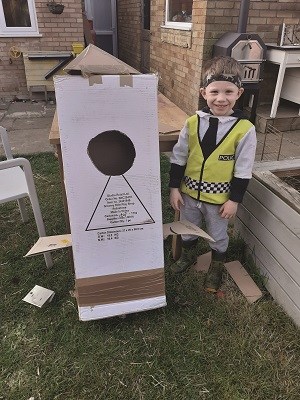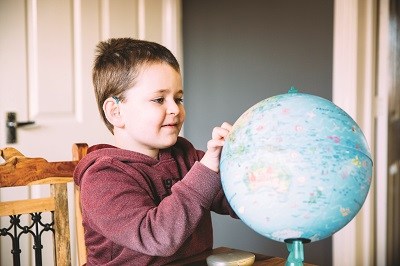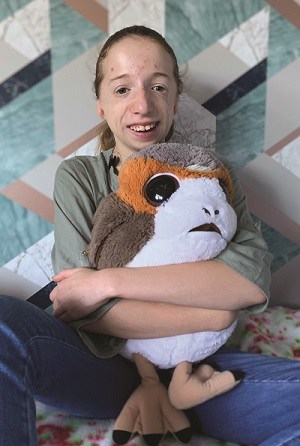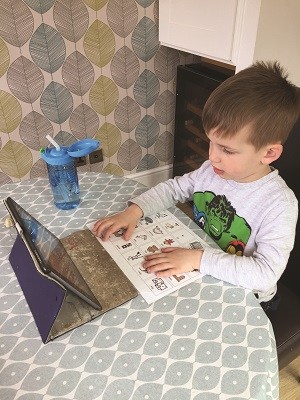How do I...learn at home with my child?
In 2020 we’ve all spent a lot longer than normal at home. With schools being shut earlier this year and the long summer holiday coming up, we’ve asked parents to tell us their top tips for learning with their child at home. Remember you’re not your child’s teacher and your child will be learning even when they’re just hanging out, communicating and playing with you. You have all the skills you need to help your child to learn.

Esme is mum to Isaac (4) who is profoundly deaf and wears cochlear implants.
We always keep background noise low at home in order for Isaac to hear as well
as possible, so we rarely have the TV or radio on unless we’re all watching something together. Isaac will only happily engage in learning about things which interest him, mainly vehicles, hospitals and space. We look at lots of books, talking about what we can see on the pages. Isaac also loves reading and happily reads his school book to me every night.
We spend a lot of time outside. We did a scavenger hunt on a walk recently which Isaac really enjoyed, he had to look for different textures and colours. It helped encourage him to walk all the way round our village. When in the garden, I always ask him what he can hear to help him differentiate between different sounds.
Isaac has an iPad and, as long as it’s used in moderation and wisely, it’s really beneficial to his learning. His favourite game is My Town which lets him wander about in a world with a hospital, police station and school. This helps him learn about everyday objects and how the world works.

Rachael is mum to Elijah (7) who is moderately deaf and wears hearing aids.
I’m a mum of two and we’ve been home educating for three years now. During the coronavirus (COVID-19) lockdown, I tried to keep to our normal routine as much as possible to help the children feel secure, while enjoying a whole host of new material which is available online.
We did Joe Wicks’ PE class for 30 minutes every weekday on YouTube, which we found was an excellent way to start the day energised and positive. It’s easy to follow, even with no sound.
We also used Science with Maddie Moat on YouTube, Dad Lab on Facebook and the National Geographic Kids UK website. 3D Google animals and BBC documentaries, which can be found on BBC iPlayer and Netflix, have so many science ideas, using things you have at home or free printable resources. I find watching a short video will spark my children’s interests to further research a topic and create a fact file, poster, newspaper or video report. Their grandparents love me sending pictures or videos, especially while social distancing, and the children feel a real sense of achievement creating something. Topic work like this can cover literacy, geography, history and religious studies.
There’s also a range of worksheets and resources online, Twinkl (which has British Sign Language resources) and Reading Eggs/Maths Seeds.
Cooking together, board games and even playing with dice are an easy way to add maths into the day too.

Josie is mum to Maia (14) who has Treacher Collins syndrome and wears a bone-anchored hearing aid.
Since Maia started secondary school she’s been encouraged to work as independently as possible. This is just as well for us parents, as the work is increasingly complex and we would fear confusing her – or in teenage speak ‘interfering’!
Maia has a planner where she notes her homework, and she also receives tasks via school email. She seems to cope with the responsibility of it all, and her teachers and friends are very supportive and quick to clarify anything she is unsure of. Maia and her friends use their smartphones for sharing pictures of notes, making voice memos and texting deadline reminders to each other. To support her learning, Maia also refers to CGP revision books and various websites and apps such as BBC Bitesize, Linguascope, MyMaths and Quizlet. She also finds making visual aids like flashcards helpful, as well as motivational treats like novelty highlighters!
Of course, we parents are allowed to help out sometimes. Maia has always enjoyed talking to us about what she’s learning at school and this does seem to benefit her understanding.
She often mispronounces new words and this chat time provides a good opportunity to iron out some mistakes. She has recently begun using the audio pronunciation tool in online dictionaries to help with this too.
Sometimes, if she’s found a lesson particularly confusing, she’ll ask us to go over the content with her so she feels more secure. She’ll also seek us out to quiz her if she has an upcoming test.

Maria is mum to Alex (4) who is moderately deaf and wears hearing aids.
Due to his hearing loss, Alex has delayed speech. He’s working really hard with his Speech Therapist on his sounds, to improve his speech ready for when he starts Reception in September. This means we have homework set to work on his sounds. We try to make this into games Alex will enjoy, for example making a silly story using all of his sounds. We also have little competitions with his big sister, where I show them a picture and they have to say the word with the correct sound. If there’s a day when Alex isn’t feeling very cooperative, the promise of a chocolate button always smooths the process!
During the coronavirus lockdown, Alex had his speech therapy sessions delivered by video link. These sessions seemed to work well, as Alex was given control of the screen and was able to draw and interact in the session. Making learning fun and interactive really helps to engage him, but there are times where I have to recognise he really doesn’t want to do it! It can sometimes be a fine balance between encouraging and knowing when to try at a later time.
